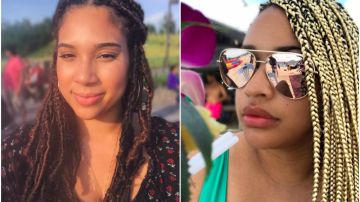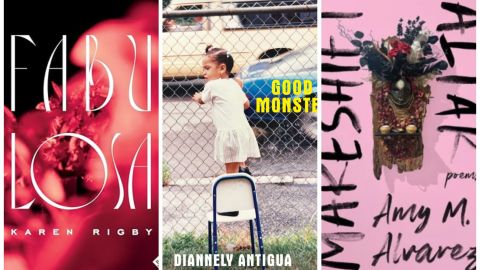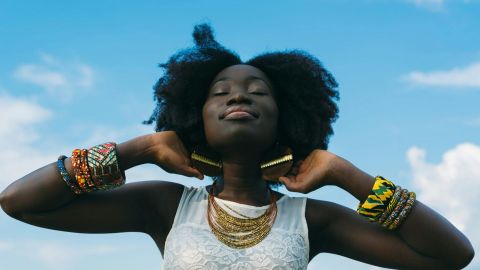Latinas Wearing Black Hairstyles: Cultural Appropriation or No?
There’s been a lot of talk about cultural appropriation lately, and it has mainly centered around white women co-opting black culture

Photo: Instagram/allthingssada & Instagram/vinylblush
There’s been a lot of talk about cultural appropriation lately, and it has mainly centered around white women co-opting black culture. Celebrities like Katy Perry and pretty much the entire Kardashian-Jenner clan have rocked dreadlocks, box braids, and bantu knots without ever acknowledging where these hairstyles originated. It’s especially upsetting when we see white women appropriate black styles while refusing to use their privilege to actually speak up for the black community.
“Cultural appropriation is the adoption or use of the elements of one culture by members of another culture. When anyone is replicating a style that originated within another community or culture, they should be careful to not represent it in a way that perpetuates racist stereotypes,” says clinical psychologist, Dr. Christine Adkins- Hutchison. “They should understand the origins of a particular style and, perhaps some of the history related to the style within that community or culture. The women should not wear the style as a ‘costume,’ but as representing the part of herself that is part of that culture or community.”
This is precisely why a lot of white women get so much grief. They wear these styles without making an effort to understand their origins.”Not only is there a rich African tradition behind some of these styles, but for years black women have been labeled “unprofessional” or “not put together,” when wearing them.” Black women and girls still face a lot of discrimination when they choose to wear their hair natural.
But what about Latinas rocking black hairstyles? Is this also cultural appropriation? For Latinas of African descent, rocking a hairstyle like box braids or bantu knots shouldn’t cause hesitation because Afro-Latinas are mixed race. Many have hair textures similar to that of black women. Yet I still found Afro-Latinas who were concerned with rocking these hairstyles out of fear of being accused of cultural appropriation. I even came across a couple of forums online where folks asked if it’s considered cultural appropriation when a Latina wears her hair in braids?
Ada Rojas is a Dominican-American lifestyle blogger who lives in uptown Manhattan and identifies as Afro-Latina. She recently sported faux locs as a way to protect her naturally curly hair.
“I was worried about how the black community would react at first because I didn’t want to seem like I was culturally appropriating but as an Afro-Latina, how can I be appropriating culture if these styles originated from my ancestors?” she said. “I got an overwhelming response from the black community and I think it just affirmed the fact that at the end of the day, it’s really all about texture and protecting your hair is an essential part of maintaining your curls and kinks.”
“If Latinos are wearing their hair in natural styles because they are looking to accentuate their own beauty – have at it!” says Dr. Hutchison. “After all, rocking natural hair should be about power and beauty at its finest. Anyone who is attempting to do so without giving credit where credit is due, is contributing to the cultural appropriation. A Latina woman should be able to acknowledge her African ancestry as she is sporting her do.’ This demonstrates that respect and willingness to acknowledge another’s identity is to empower and not disempower.”
Cindy Diaz, a Dominican-American writer and YouTube Vlogger from Brooklyn decided to rock box braids this summer, a style that’s become incredibly popular among Latinas lately. All you have to do is go on Instagram and you’ll find more than a dozen Latina bloggers and influencers rocking the style.
https://www.instagram.com/p/BYO0-S-jEcK/?hl=en&taken-by=vinylblush
“I was going on a trip to Thailand and thought it would be the perfect style for me not to worry about my curly hair,” says Diaz. “It is very hot and humid there and I didn’t want to spend a lot of time getting ready in the morning. Seeing a lot of bloggers rocking them this year was a huge source of inspiration.”
Like Rojas, Diaz wasn’t too worried about the response she was going to receive.
“I wasn’t worried because I am Afro-Latina. Since I’m mixed race, I don’t consider it cultural appropriation. But I don’t agree that Latinas in general rocking black hairstyles isn’t cultural appropriation. Not all Latinas are black or mixed race, or identify as such.”
Diaz’s point is an important one to consider because there’s a huge difference between being a mixed race Latina who acknowledges and embraces her African ancestry while rocking a style like this, and a Latina who might identify as white and refuses to acknowledge or respect the style’s origins. This is where things can get offensive, especially for the black community.
“Some people are offended because they feel that, often, the majority culture has taken liberties to adopt traditions and more of African Americans, without otherwise supporting them as a group,” says Dr. Hutchison.
In fact, that’s one of the issues a lot of African Americans have with the Kardashian-Jenner clan. Last year Amandla Sternberg made a statement on a picture Kylie Jenner shared to Instagram, of her wearing cornrows. “When you appropriate black features and culture but fail to use your position of power to help black Americans by directing attention towards your wigs instead of police brutality or racism,” she wrote.
This is where things can get tricky. The truth is, Latinas come in various races from white to mixed race, Black a.k.a Afro-Latinos, and indigenous. An Afro-Latina rocking box braids to protect her curls and honor her African ancestry is not the same as a “white” Latina rocking box braids. In fact, a “white” Latina or white identifying Latina who chooses to wear a black hairstyle can be considered an example of cultural appropriation. Take for instance the head-wrap situation in Brazil. Earlier this year a white Brazilian woman had posted a photo of herself wearing a headwrap to cover her head while she was undergoing treatment for cancer. The photo stirred serious debate regarding the kind of struggles and discrimination black Brazilian women have experienced for wearing headwraps that were associated with their African ancestry and for sporting their natural hair texture.
“It’s like saying, ‘We don’t like you, but we like your stuff. We’re gonna take it, use it, and have others assume that it’s ours, without acknowledging where it came from,’” Dr. Hutchison adds. “So when other marginalized cultures do the same as the majority culture, the response is similar. For example, it can feel as if it makes a hairstyle “cool” for Latinas [who are not of African descent], whereas, the same hairstyle might be considered “too ethnic” for African Americans in their experience with the majority culture. With a history of so much being ‘taken’ from African Americans, it feels offensive, insulting, and threatening for more to be taken away.”
I’m not saying, Latinas that don’t have African descent can’t rock black hairstyles. I’m not even saying white, non-Latina women can’t rock black hairstyles. But it’s important to recognize that these hairstyles originated from black culture and to acknowledge a lot of the pain and discrimination black women have had to face when they wear their hair in it’s natural state. The same styles that might be seen as cool, trendy, or even edgy on non-black women, have been perceived as “ghetto,” “messy,” “criminal,” and even “dirty” on black women. Let’s not forget about that time Giuliana Rancic said that Zendaya’s dreads made her look like she “smelled like patchouli oil or maybe weed.”
Part of fighting for true equality is making an effort to understand other’s culture. The decision a black woman or woman of African descent made to sport one of these styles or to wear their hair natural was,for many years, seen as a political movement of resistance. And the truth is, non-black women didn’t exactly have their backs when all of that was happening. Let’s truly acknowledge and honor where these styles came from while also respecting culture and the reality of the struggle. It’s baby steps like this that makes the world a better more equal place for all of us.

















